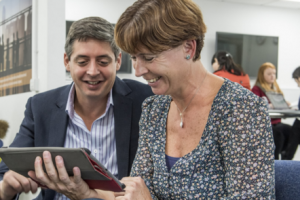Learning in the Network Age MOOC – starts 24th April
 Our latest course in the Web Science series of MOOCs is called Learning in the Network Age and it begins on 24th April. The course will be run by Lisa Harris and Nic Fair from the Web Science Institute and it includes contributions from a number of other university staff, students and alumni. The aim is to empower university students and staff around the world to develop their digital literacies and use their Personal Learning Networks effectively in order to maximise their lifelong learning potential.
Our latest course in the Web Science series of MOOCs is called Learning in the Network Age and it begins on 24th April. The course will be run by Lisa Harris and Nic Fair from the Web Science Institute and it includes contributions from a number of other university staff, students and alumni. The aim is to empower university students and staff around the world to develop their digital literacies and use their Personal Learning Networks effectively in order to maximise their lifelong learning potential.
Since the introduction of the World Wide Web and its associated mobile devices, societies and individuals have become much more connected to each other and to information than ever before. The Web is no longer simply an information resource, but also a space for interaction and creativity through which learners can develop a network value, potentially on a global scale.
In this world where knowledge is widely available, accessibility to it is determined and dependent on individuals’ ability to interact effectively with it. Therefore, from a very young age, we may best be characterised as networked individuals living and learning in a networked society, with our digital identity as important to our network value as our offline identity.
As a result, within the educational context, the Web and digital technology are no longer merely tools for teaching and learning, rather they are an integral part of the learning process, much as pen and paper used to be. This has had a profound effect on the way we learn. It has changed how we find, use and store information; how we communicate and collaborate; and how we create, present and share our ideas.
Professor Dame Wendy Hall, Executive Director of the Web Science Institute, says:
“This course is a timely addition to the Web Science series of MOOCs. It showcases the current research of our PhD students and the direct benefit their work brings to all learners in the digital age.”
The main topics covered in the course will be:
- What it means to be a university learner in the Network Age.
- The impact of Digital Differences on our learning networks.
- Investigating what our Personal Learning Networks (PLN) look like and identifying patterns in how we currently use them.
- Growing our PLNs and assessing the reliability of online information and services.
- Managing our PLNs and our online identity.
- Activating our PLN for learning purposes.
- Exploring a wide range of digital tools to assist with growing, managing and activating our PLNs.
The MOOC is being used as a revision aid and engagement tool for students studying the Curriculum Innovation module Online Social Networks this semester. Its impact in terms of added value to their studies is being evaluated as a case study for the Researching Assessment Practices (RAP) Catalyst A project led by Professor Carol Evans and funded by HEFCE.
The MOOC serves the additional function of data collection for current PhD research, and it provides a clear example of partnering and co-creating with students, with implications for both REF and TEF. The research element of this MOOC is innovative because it does not collect data for research about MOOCs, which is common, but collects data for research into the subject area of the MOOC (Personal Learning Networks). This could become a new form of research methodology and provide these types of MOOC with an important future role for universities.
To join the course or find out more information, check out the course page on FutureLearn, contact us via our Twitter account @uosFLwebsci or search #FLlearningnetworks on social media.
Click here for more information about all upcoming University of Southampton MOOCs.
